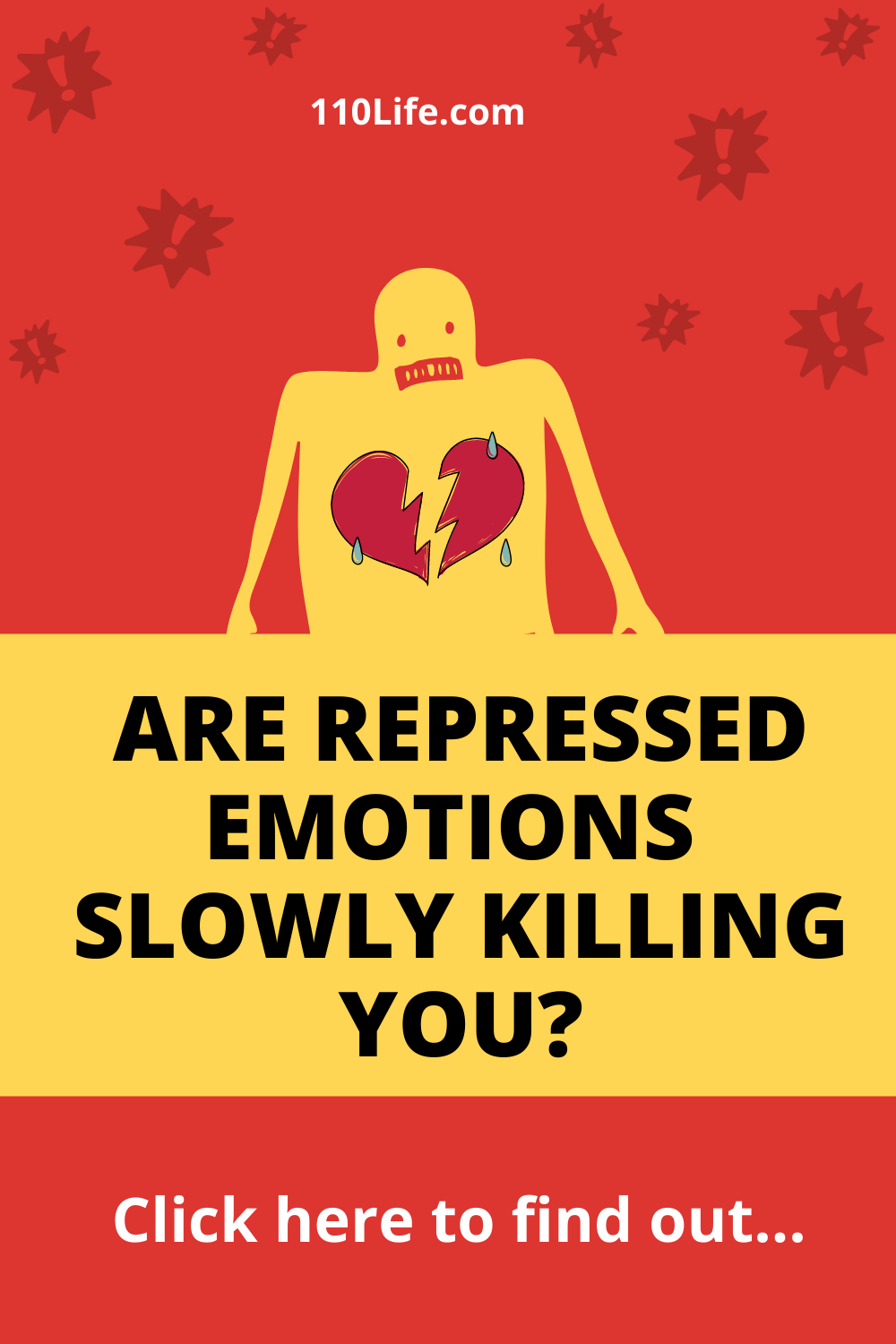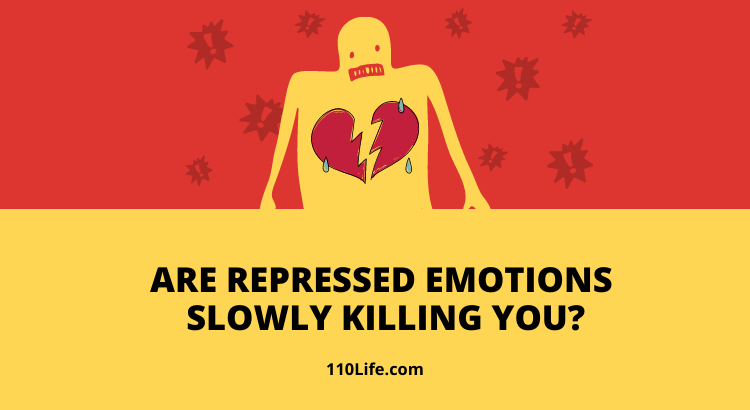Repressed emotions are something that we really need to bring to light, discover, and work through to get to our ultimate state of happy. Happiness is one of the biggest keys to getting 110% out of life. When you're happy you're more motivated to do what it takes to truly live. I'll be doing a series of posts here on “inner healing” to help you get to the happies point you can be at and keep yourself there as much as possible!
Let's get started with talking about repressed emotions…
The emotions that you unconsciously avoid are your repressed emotions. These are the emotions that you don’t know exactly how to deal with so they become feelings you purposely avoid. These emotions are different from suppressed emotions.
Example…
For instance, let's say you're still staying with your parents because you've been trying to save on rent or because you've become so attached to your parents and you're yet to find the courage to live on your own.
One Monday morning, you and your parents had a little tiff and you decided you were going to move out in the next few days. You still had to manage to go to work that same Monday morning without allowing the little situation to get the best of you, knowing that you could still address the situation with your parents when you got back from work.
Note that, at times, it could be a good short-term solution to push aside or suppress your feelings but it becomes dangerous when you keep those emotions hanging for a long time without addressing them. However, repressed emotions, are emotions that tend to show up in diverse physical or psychological symptoms, and they don’t get a chance to be processed.
Why does it Happen?
Our childhood experiences have a close relationship with emotional repression. As a young person, your parents or primary caregivers have a significant impact on your communication and behavior. If your caregivers didn’t judge or criticize your emotional expressions, made it normal for you to experience positive and negative emotional experiences, encourage you to share how experiences made you feel, and frequently talked about their feelings, the chances are high that you'll feel pretty comfortable expressing your emotions.
However, if you had a different childhood experience, you'll feel disconnected from your feelings as an adult dealing with repressed emotions. If your caregivers denied your experience, told you your emotions were wrong, shamed or punished you for expressing your emotions, never talked about their feelings, or rarely showed emotion, it's more likely that you'll repress emotions.
As you keep growing, there's a tendency that you'll keep pushing your noticeable emotions aside. You'll continue to unconsciously bury strong emotions because you've learned that it's pretty much safer to avoid your emotions entirely, especially if you had distressing or painful outcomes by showing your feelings in childhood.
What Kinds of Emotions Get Repressed?
Emotions that are associated with unpleasant experiences or discomfort are some of the strong emotions people tend to repress. Disappointment, fear, sadness, frustration, and anger are the kind of emotions that fall under these strong emotions. They're negative emotions. If you feel you might be judged by others for expressing some of these emotions or you think some of these emotions are “bad”, it's very likely that you'll repress them. And that's NOT a good thing. 😉
If you grew up hearing things like “you should be grateful,” “calm down, you're just overreacting and it's totally unnecessary,” or “there's no reason why you should be sad,” you'll become prone to repressing your emotions.
In fact, when you're told to stop shouting or crying and not encouraged to freely express your intense emotions, you'll become vulnerable to repressed emotions, even if your emotional experience didn't specifically get invalidated by your caregivers. Consequentially, you'll find it difficult to acknowledge your disappointment, anger, and sadness because you feel they're feelings that you shouldn't possess. However, a few other people dealing with emotional repression can still express emotions that are generally accepted by others or those considered “normal” and they could feel more in touch with positive feelings.
Can it Really lead to Physical Symptoms?
While you may still be wondering if your emotions can make you sick, it's important that you know that, truly, they do have a way of making you sick. Yes, anger doesn't cause cancer and neither does sadness give you flu, but you should know that you can recover slowly and get sick more frequently when your immune system doesn’t work properly due to a decreased immune system function linked to your emotional repression — research has proven this.
More so, depression, anxiety, stress, and a few other mental health conditions can be factored in by repressed emotions. You're likely to express some physical symptoms, which include:
* Sleep problems and fatigue
* Appetite changes
* Nausea and digestive problems
* Pain and muscle tension
These are just a few symptoms…
It's also been proven that a number of people who suffer chronic illness have repressed emotions and childhood trauma as contributing factors.
There are significant health consequences attributed to unresolved anger as well and you stand a high chance of developing cardiovascular disease, digestive problems, or high blood pressure if you're finding it difficult to express anger in productive ways.
How do I know if I have Repressed Emotions?
Since there are no definitive tests you can take to know if you're dealing with emotional repression, you may find it quite difficult to know if you have repressed emotions. However, you're likely to notice a few key signs if you're struggling with repressed emotions. These signs affect how you treat other people and yourself and they can be evident in your behavior or feelings.
Recognizing Emotional Repression in your Feelings
Naming and understanding your emotional experience is something you'll often find troubling when you're dealing with repressed emotions. When your needs are not served by certain aspects of your life, you may find it difficult to recognize that, and it could as well be tough to describe your feelings to others.
You may experience this:
* When someone asks you about your feelings, you feel distressed or irritated
* You never ponder on upsetting or insignificant things and this makes you feel cheerful and calm most of the time
* When other people tell you about their feelings, you experience unease or discomfort
* You have a tendency to forget things
* You never understand why but you feel stressed, low, or nervous most of the time
* You regularly feel numb or blank
Again… Just a few examples here.
Recognizing Emotional Repression in your Behavior
The manner in which you respond to others and your behavioral expressions is how repressed emotions commonly show up. You might develop problems in your interpersonal relationships when your emotions get in, especially when they get triggered by small things. Your built-up emotions can explode after you've been struggling to express them healthily.
These are the abilities emotional repression can affect:
* Your ability to encourage or praise yourself
* Your ability to understand how other people feel
* Your ability to build intimate relationships
* Your ability to talk about things that matter to you
It's also possible that you notice some of these things:
* Dealing with situations that upset you make you exhibit passive-aggressive behaviors
* You avoid being alone by spending most of your time with other people
* You avoid feelings you don’t want to explore and stay numb by using social media, TV, substances, or other activities
* Rather than express what you really want and need, you just go along with situations
* Another plausible sign is often being referred to as “relaxed,” “calm,” or “chill” by others.
Are any of these things “hitting” you right now?
Is it Possible to Release them?
A good first step you can take is to talk to a mental health professional if you find it quite troubling to express or regulate your emotions. You can enjoy guidance and support and have a safe space to learn more helpful methods of emotional regulation.
Note: If the term mental health professional sends you over the edge, know that you have many options other than the standard “shrink”. A little searching on the Internet can show you many alternatives to health professionals that can help you. Even educating yourself can help you.
You can beef up your comfort level around talking about emotions and work on naming and understanding your feelings when you get therapy. Aside from therapy, a handful of strategies will also help you manage and deal with your emotions effectively. I'll be sharing these strategies in future posts and will be linking to those posts at the bottom of this post.
For now though let what you've read here marinate in your mind. Do you have repressed emotions that are coming out in your life? Start by naming them, and acknowledging them, so you can get on the path of releasing them.

